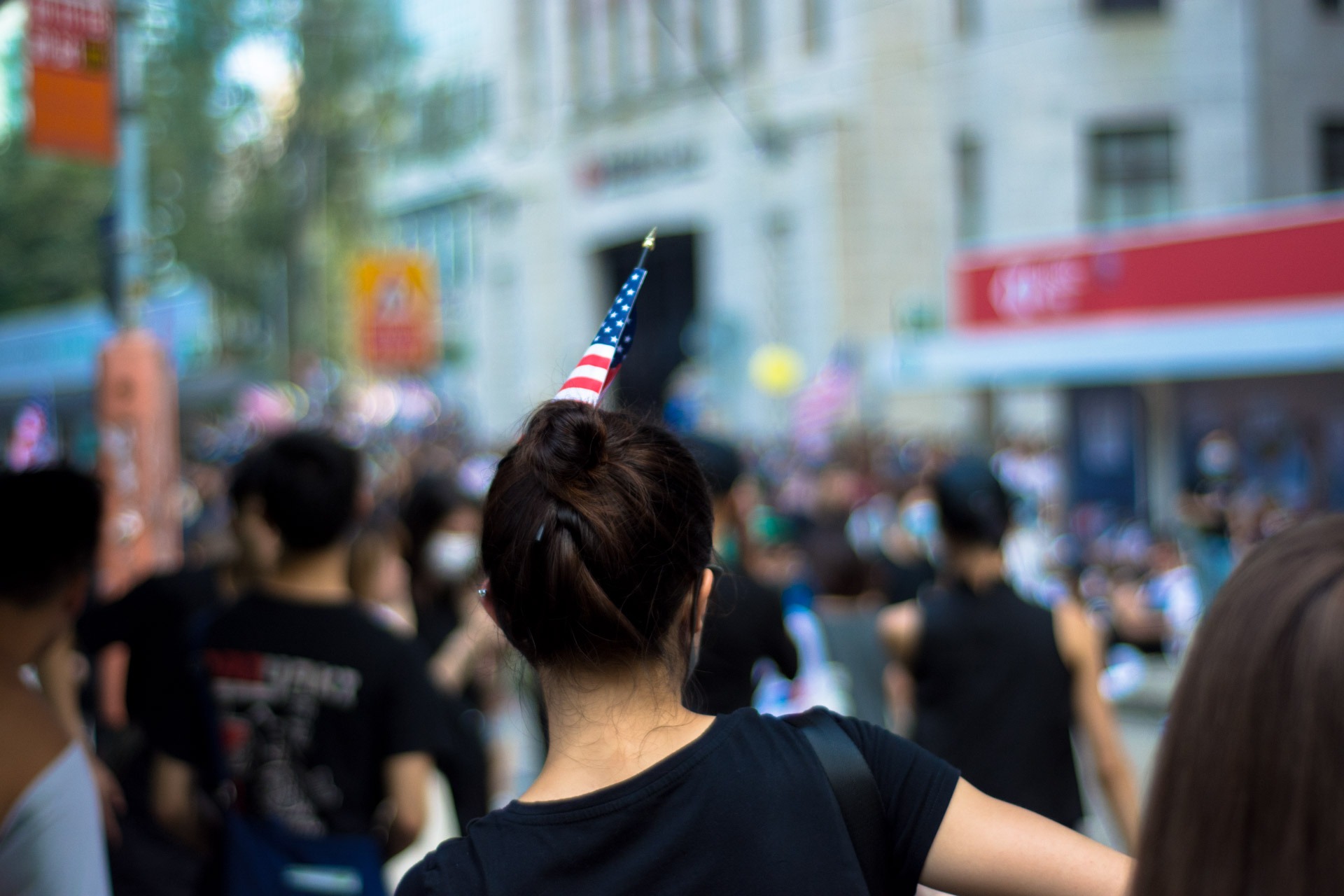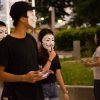Originally published in The Volcano. Republished with permission. Read this article in Bahasa Indonesia.
In June, millions took to the streets in Hong Kong to oppose a bill that would formalize an extradition agreement with China. Then, in response to police brutality and government repression against what was initially a single-issue movement, protestors adopted a list of five demands that renewed the call for universal suffrage. But this does not mean the movement has developed a fulsome politics. Over two months into the struggle, the majority of the anti-extradition movement remains distrustful of established opposition groups and politically heterogenous—the streets are the theatre of the movement, where spontaneous, militant protests continue to gain momentum, and the state’s attempt to quell unrest appears to have only garnered more support for the movement, particularly the demands for an independent police inquiry and the complete withdrawal of the bill.
Those of us watching from abroad have seen dizzying images of protests, with militant self-defense tactics, general strikes, and face-offs with cops and pro-government thugs prompting unprecedented disruptions to the city’s political, infrastructural, and economic stability. The appearance of the “Liberate Hong Kong! Revolution of our times!” slogan during the August 5 general strike prompted Chief Executive Carrie Lam to announce that “extreme activists” are threatening national sovereignty and “One Country, Two Systems.” But the explosive energy of these protests continue to rely, at least discursively, on the same five demands adopted in June, and the cross-class character of the movement obscures the competing class interests in play when it comes to questions of democratic reform and political autonomy.
The politics of the anti-extradition movement are not only a question of who is demanding what in Hong Kong; inter-imperialist rivalry and power contextualize the movement as well. Leaders in western, imperial nations, from Donald Trump to UK Conservative leader Jeremy Hunt, were quick to vocalize their support at the outset of the anti-extradition protests, emphasizing their approval of Hong Kongers’ demands for “freedom” and “democracy”—the values that western imperialism relies upon to fashion itself as the world’s moral beacon. While Trump has since back-pedalled from his initial support, House Speaker Nancy Pelosi recently released another statement in August supporting the movement. In the context of an escalating US-Sino trade war, declarations of support from western nations, as well as the messaging of some Hong Kong protestors themselves, rely on a contemporary Cold War rhetoric that reinforces western hegemony and inadvertently foreshadows the limitations of a framework of “self-determination” for Hong Kong. Given the city’s role as a global finance centre, shifting its political allegiance away from Beijing inevitably means pivoting toward Washington.
Leftists both in Hong Kong and abroad can help clarify the class character of the movement and build international solidarity that resists aligning with imperialist interests.
For leftists in Hong Kong, the anti-extradition movement is an opportunity to reintroduce, in a society that is nearly McCarthyite in its anti-communism, an anti-imperial and anti-capitalist analysis that highlights the shared interests of the working class across national borders. But such a project must necessarily reimagine the protagonists of the struggle itself. The flattened image of the classless Hong Kong citizen battling the external force of the Chinese state functions as an ideological form of US power, masking internal and divergent class interests bound up in both the anti- and pro-extradition bill camps. By rejecting citizenship or national belonging as useful rallying points or analytics in mapping terrains of struggle, leftists both in Hong Kong and abroad can help clarify the class character of the movement and build international solidarity that resists aligning with the imperialist interests of the newly “old” Euro-American power.
Rejecting the classless Hong Kong “citizen” as the protagonist of struggle means confronting whose self-determination is being asserted in the demand for universal suffrage. What would a political independence that retains Hong Kong’s economic system mean, if not substituting Beijing with Washington? And what would it mean for Hong Kong’s working classes, if not the substitution of one political elite for another?
Insomuch as defending and expanding Hong Kong’s political liberties safeguards class struggle, both in Hong Kong and China, anti-capitalists everywhere should support the anti-extradition movement. But if we agree that Hong Kong and China’s working classes have shared interests, and that they depend on one another to advance those interests, then the premise that “more democracy” in Hong Kong alone advances class struggle is a problematic one.
Mainland activists and labour unionists and their Hong Kong allies offer another way of conceiving of the border: they use “One Country, Two Systems” strategically, treating class conflict as a struggle that crosses the China–Hong Kong border. This precedent can serve as a guiding light to the inchoate anti-extradition movement—a reminder that Hong Kong and China’s working classes have everything to gain from banding together against their mutual enemies, and that the border, which is itself a British colonial remnant, must not foreclose their unity.
Hong Kong and China: Not a case of ‘the right to self determination’
In Vancouver, a Pacific Rim city with a large Chinese and Hong Kong diaspora, Chinese-Canadians have organized multiple solidarity protests and vocalized passionate support for Hong Kong’s anti-extradition protestors. A well-intentioned open letter supporting the “democratic movement” in Hong Kong highlights the liberal framework that these expressions of solidarity rely on: the letter fails to take a side in the inherent contradictions between freedoms for capitalist markets and political liberties for working-class people in Hong Kong, and dismisses the imperialist interests of Canada and the US against China. These distortions project a political coherence onto the anti-extradition struggle that does not exist.
The letter warns of “recent government efforts to erase the Cantonese language and Hong Kong people’s unique sense of cultural identity,” and then implies some kind of anti-colonial continuity between Indigenous people on Turtle Island fighting to retain their cultures, and the fight in Hong Kong for democratic self-determination. This knee-jerk expression of support is mistaken. If anything, Cantonese is the hegemonic language threatening to eradicate Indigenous dialects in Hong Kong. If we consider Cantonese-speaking Hong Kong people, most of whom are fairly recent immigrants, as Indigenous people oppressed by colonial power, where does that leave the Tanka, Hakka, Weitou, and Hoklo-speaking peoples who were actually living in the archipelago prior to the British takeover? Hong Kongers’ “unique sense of cultural identity” is a recent phenomenon, largely amongst youth, that emerged alongside and within right-wing nationalism. The claim that Hong Kongers are not Chinese relies on an ahistorical understanding of identity premised on superiority, an implicit embrace of western imperial power, and the racialization of mainland Chinese people.
The open letter’s framing of the anti-extradition movement as a struggle for Hong Kong self-determination unintentionally gestures at a Bolshevik strategy originating in 1913. The Bolsheviks asserted that it was the obligation of socialists in imperialist countries to support the self-determination of nations oppressed by colonial domination. The premise of this strategy was that colonial domination acts as a brake on class struggle within a colonized nation, as pressure from the occupier presses classes together and forces the colonized working class to collaborate with the colonized bourgeoisie in a war for national liberation.
The Bolsheviks argued that this stage of cross-class collaboration against imperialism was a necessary step before the working class could fight for their own liberation from capitalism. But this is not the situation in Hong Kong. Characterizing China as a colonial dominator of Hong Kong misleadingly suggests that China is the only barrier to a project of political self-determination, and that the freedom of Hong Kong’s working class can be achieved by collaboration with the Hong Kong bourgeoisie and Western capital, rather than collaboration with the working class on the mainland. While China’s political power over Hong Kong suppresses both bourgeois and working class forms of struggle, that does not make the dynamic between China and Hong Kong colonial.
Drawing an empowered national border around Hong Kong would only threaten unity with China’s working classes and help push labour struggles on the mainland completely underground.
Setting aside the complicated question of what constitutes a nation, socialists can navigate calls for Hong Kong’s political autonomy and independence by considering what independence would mean for class struggle in the entire region, and how an independent, or autonomous, but still capitalist Hong Kong would fit into imperial alliances. While there may be arguments for asserting a Hong Kong nationhood that isn’t premised on the naturalization of British colonization, such a nationhood would necessarily rely on a colonial border to determine lines of inclusion and exclusion. Drawing an empowered national border around Hong Kong would only threaten unity with China’s working classes and help push labour struggles on the mainland completely underground. If class struggle in China is already a cross-border struggle, politically and strategically, then the present case for Hong Kong’s independence from China can only threaten that struggle.
The class character of the anti-extradition movement
Many of the possibilities and limitations that the anti-extradition movement contends with were inherited from the Umbrella Movement of 2014. The national democratic and “scholarist” leaderships of the Umbrella Movement left a political landscape characterized by the conflation of militancy with reactionary nationalism, a weak and fragmented left, and an abiding belief in “democracy” as a catch-all solution to problems that are not merely political, but social and economic as well.
That landscape has been radically altered over the past two and a half months. Protestors’ reliance on guerrilla self-defense tactics has cast off the yoke of respectability that, even in the beginning of the anti-extradition movement, figured prominently in public imagination. But the Umbrella Movement’s legacy of collapsing all ills into the vague, petty-bourgeois diagnosis that “we need democracy” continues to haunt and limit the anti-extradition movement, while the very spontaneity that distinguishes it from 2014 makes its class character and internal ideological consistencies difficult to parse.
A recent study found that nearly three-quarters of protestors have some kind of post-secondary education, compared with one-third of the general population, and half self-identify as middle class. The two largest political camps represented are pan-democrats and localists, with nearly 40 and 30 percent of protestors identifying with these labels respectively. The protestors’ demand for an independent commission on police violence enjoys support from a host of prominent business leaders, including the Hong Kong Chamber of Commerce, and pro-democracy billionaire Jimmy Lai’s attack on the extradition bill may as well be titled “Why democracy is better for business.” But bourgeois leadership and influence spans the pro-Beijing versus pro-democracy divide, as figures from both camps regularly point to the safeguarding of Hong Kong’s economy as a justification for their mutually exclusive agendas. The strategic question for the working class, however small its participation in the struggle may be, is what it has to gain, or lose, by collapsing its interests into a cross-class movement that not only seeks to safeguard existing liberties, but calls for democratic reforms and, however vague and rhetorical, political revolution.
Replacing the worker with the citizen: Borders are a brake on working-class unity
The anti-extradition movement’s use of general strikes surpasses a limitation of the Umbrella Movement, but continues to defer to petty-bourgeois political frameworks. The first call for a general strike in support of the protests came from a small business, with over 100 other small and medium-sized businesses subsequently signing on. Not surprisingly, the rhetoric around general strikes relies on a declassed analysis that centers the “Hong Konger” rather than the worker.
When the HK Confederation of Trade Unions, which is a pro-democracy trade union, called for a general strike on June 17, it released a statement calling for support across all classes that emphasized how the extradition bill “causes serious damage to the business environment and affects investor confidence.” The statement goes on to smooth any class conflicts bound together through opposition to the bill by insisting that “the focus of resistance is neither employers nor managements, but to fulfill the civil responsibilities and protect the future of Hong Kong.” (They used the same statement for the August 5 general strike).
At best, the movement’s current Hong Konger–centrism foregoes unity with groups outside civic belonging, and at worst, it sets them up as scapegoats.
HKCTU has a history of supporting labour struggles in China, and they know the Hong Kong working class is not strong enough to wield power on its own. Their choice to use a cross-class framework is a calculated appeal to the broadest common denominator on a Hong Kong “national” basis, which foregoes both an emphasis on cross-border, working-class unity between workers in Hong Kong and those on the mainland, as well as an explanation of how the economic frustrations motivating many protestors relate to the deterioration of their political rights.
Socialist leftists in Hong Kong are more likely to recognize the need for international working-class solidarity, particularly because labour activists have historically relied on the Hong Kong–China border and Hong Kong’s political freedoms, as a strategic defense that makes labour organizing on the mainland possible. Lam Chi Leung, a member of the socialist group Left21, argues, for example, that “only through more collaboration with Chinese civil society and social movements that confront China’s authoritarian capitalism can the Hong Kong public secure true democracy and social equality.” But Lam’s language is still murky, and gestures at a kind of “united front” tactic, for which there is no successful precedent in Hong Kong or Chinese history. “Chinese civil society” barely exists and is hardly a vehicle for working-class autonomy (assuming Leung is referring to labour NGOs), and “the Hong Kong public” refers to that classless, citizenship constituency that includes the bourgeois democratic movement.
With some sectors of the Hong Kong bourgeoisie and petty-bourgeoisie deferring to mainland China and others resisting the erosion of their post-Handover political rights and freedoms, we need, more than ever, unapologetic working-class leadership that defends the rights that are necessary for the coming days of class struggle, and refuses national bourgeois defenses of liberty, which are easily co-opted by right-wing reactionaries. Because of obligations contracted by the Handover, workers in Hong Kong have the right to assembly, free speech, and independent trade unions. None of these rights are overtly attacked through the extradition bill, although its passage would pave the way for their greater repression.
It’s hard to imagine a coherent argument that bourgeois democracy is necessary to safeguard the political freedoms of the Hong Kong working class that doesn’t hinge on the very myths that western states rely on to naturalize colonial, imperial, and capitalist violence, and which doesn’t hand back Hong Kong to western powers by swapping out its alliance with China for an alliance with western imperial nations. The question of whether the anti-extradition movement is for greater freedoms and power for the working class in Hong Kong and China or for a separate bourgeois-democratic Hong Kong aligned with the west hinges on how we relate, strategically and politically, to the Hong Kong–China border.
Encouragingly, protestors do not seem to be taking either the far right or moderate civil society groups like the Civil Human Rights Front (the group that organized the protest calling for the G20 to intervene in Hong Kong) very seriously. But the spontaneous energies of this movement can only last for so long before they fizzle out, the government concedes enough to pacify protestors, or organizations with a coherent political ideology emerge as leaders—as localist groups did in 2014. At best, the movement’s current Hong Konger–centrism foregoes unity with groups outside civic belonging, and at worst, it sets them up as scapegoats.[1]
The stakes are high for the left to present frustrated protestors who are ready to throw their politics and their bodies on the line with an anti-capitalist, anti-imperial program to confront not only the extradition bill, but the broader social and economic worries weighing down on their shoulders. At its core, such a political vision needs to clarify both the strategic use of the Hong Kong–China border as a safeguard of labour organizing on both its sides, while emphasizing how international solidarity boosts the power of both Hong Kong and China’s working classes.
International solidarity from the belly of the imperialist beast
In the wake of the anti-extradition protests, Sinophobic commentators in Canada were quick to latch onto both liberal and right-wing expressions within the movement. The Globe and Mail published a piece arguing that British colonialism helped Hong Kong flourish and protected it from the horrors of communism; Port Coquitlam Mayor Brad West posted a video of protestors being tear gassed in order to buttress his crusade against the Union of BC Municipalities accepting donations from China; and journalist Terry Glavin, who wrote faux-feminist propaganda for Canada’s occupation of Afghanistan and helped popularize the contemporary Yellow Peril in Canada, celebrated the “revolutionary liberalism” of the protestors. For the bourgeois elements of the anti-extradition movement, defending Hong Kong’s political liberties are attractive because they will not fundamentally alter Hong Kong’s economic system or the social relations that it gives birth to. In the context of heightening competition between the old Euro-American world and China, Hong Kong financiers recognize that the “sinofication” of Hong Kong threatens its attractiveness to international investments and corporations.
Anti-imperialists everywhere should recognize that promoting working-class power in Hong Kong and intervening in western imperial power are one and the same project.
People in Canada and the US who uncritically take the least developed political expressions of the struggle at face value are complicit in Euro-America’s ongoing imperial endeavor to position itself as the brightest global expression of political and moral purity: the stronger the light shines, the harder it is to recognize the genocidal, racist foundations of these nations on the global stage. And if the flipside of this imperial project is the tendency for formerly colonized peoples to look longingly upon the bourgeois democracies of the west, then the task of the anti-imperialist is to uncover what political obfuscations make such misguided desires possible.
In Hong Kong’s case, orientations toward the border can help us parse class interests, but without the presence of robust leftist organizations, the relationship between the extradition bill and class struggle remains unclear, and the movement’s reliance on the Hong Kong citizen-protagonist bars the participation of workers across lines of citizenship and immigration. Still—the possibility of outgrowing these limitations can’t be denied, and anti-imperialists everywhere should recognize that promoting working-class power in Hong Kong and intervening in western imperial power are one and the same project.
For the revolutionary left, the anti-extradition movement evokes a debate over how the left should relate to bourgeois nationalist forces that traces back to the split in the Second International and the beginning of the First World War. The movement’s cross-class resistance against state repression is progressive, because it defends the conditions necessary for a cross-border working class movement, without which deeper democratic liberty and economic equality is impossible. But if the movement’s goal is not only to defend existing rights, but achieve new political demands—or a political revolution—then we need to ask, what forms of democracy would actually enable working people in Hong Kong, not all of whom are “Hong Kongers” per se, to shape the society they live in? How could such a project even be achieved without appealing to either the unity of China’s working classes or western nations to leverage their imperial power? While the path ahead is unknown, these are the very strategic questions that outline the necessity for a coherent politics, that outline the crucial political and strategic repercussions of aligning with a local bourgeoisie and imperial powers, versus an international working class.
In a broader landscape marked by an inter-imperial rivalry between the United States and China, a surge of right-wing populist politics, and a historical low point in the strength of the revolutionary left, we should be excited and inspired by the militancy and persistence of the anti-extradition protestors. And what demonstrates inspiration better than grappling with the difficult political questions raised, deliberately or not, by the movement?
If the failures of the left in 2014 helped clear the way for the rise of Hong Kong’s far right, then it’s clear that leftists today have a profound responsibility to offer a political platform that makes legible the root causes of the desperation animating protestors. Such a platform needs to clarify the relationship between political rights and class struggle, between imperial interests and local demands, and within the working class as it lies on either side of the Hong Kong–China border. With the right political intervention, the anti-extradition movement could help clear the way for an anti-capitalist insurgency that bounds away from both Beijing and Washington and leverages “One Country, Two Systems” to build revolutionary, cross-border class struggle.
Footnotes
[1] In July, one protest targeted mainland “parallel traders,” and another one targeted middle-aged women, most of whom are mainlanders, who dance to Mandarin-language songs in a public park and are accused of sullying public spaces by engaging in begging and sex work.
Further reading
Hong Kong: Anarchists in the Resistance to the Extradition Bill
Other Voices from the Anti-Extradition Movement
Everything You Need to Know About the Hong Kong Protests & The Rebellion is Intensifying in Hong Kong
Black vs yellow: class antagonism and Hong Kong’s umbrella movement
Pacific Rim Anti-Chinese Nativism and the Safeguarding of the Liberal World Order







